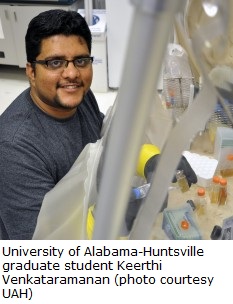 Researchers at the University of Alabama in Huntsville have found a strain of bacteria that could turn glycerol, a by-product of biodiesel production, into another alternative fuel … butanol.
Researchers at the University of Alabama in Huntsville have found a strain of bacteria that could turn glycerol, a by-product of biodiesel production, into another alternative fuel … butanol.
This story from the school’s news website says the research is being done by a graduate student with funding from the National Science Foundation:
Disposing of glycerol has been a problem for the biodiesel industry, according to Keerthi Venkataramanan, a student in UAHuntsville’s biotechnology Ph.D. program. “Many companies have had problems disposing of it. The glycerol you get as a byproduct isn’t pure, so it can’t be used in cosmetics or animal feeds. And purifying it costs three times as much as the glycerol is worth.”
The volume of glycerol produced is also daunting: About 100,000 gallons of glycerol is produced with every million gallons of biodiesel manufactured from animal fats or vegetable oils. (In 2009 more than 500 million gallons of biodiesel were produced in the U.S. while more than 2.75 billion gallons were produced in Europe.)
He is working with the Clostidium pasteurianum bacteria, which “eats” glycerol and produces several potentially useful byproducts.
“This strain is found deep in the soil,” he said. “It was originally studied for its ability to ‘fix’ nitrogen from the air.”
The bacteria uses glycerol as a carbohydrate source. From that they produce three alcohol byproducts — butanol, propanediol and ethanol — plus acetic acid and butyric acid. Butanol is a particularly interesting byproduct.
“Butanol is a big alcohol molecule, twice as big as ethanol,” Venkataramanan said. “You can use it as an industrial solvent and it can be used in cars, replacing gasoline with no modifications. It doesn’t have some of the problems you have with ethanol, such as rapid evaporation. And ethanol is a two-carbon molecule, but butanol is a four-carbon molecule so its energy value is much higher. In fact, there are plans to use it for jet fuel.
The article says that the bacteria also turn glycerin into a chemical used to make plastics. Plus, since it is non-pathogenic, the bacteria are better for the environment.

